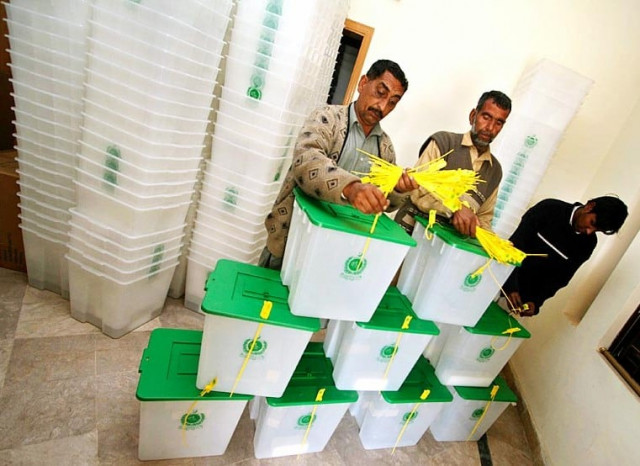Election process begins: Poll commission unveils schedule for 2013 polls
Nomination papers to be submitted by March 29 at the latest.

PHOTO: ONLINE/ FILE
The election process swung into motion on Friday as the Election Commission of Pakistan (ECP) announced the schedule of the May 11 polls for the National Assembly and the provincial legislatures.
According to the ECP notification, the returning officers have to issue public notices in all constituencies today (March 23), asking prospective candidates to file nomination papers. The papers will be accepted by the returning officers between March 24 and March 29. The papers will then be scrutinised starting March 30.
Nomination papers following the new format devised by the ECP, which has columns for prospective candidates’ financial history and a list of their dependants, have already been sent to districts. According to the proposed scrutiny procedure, the returning officer will send scanned copies of the forms to the ECP headquarters, where a committee comprising officials from the commission, Federal Board of Revenue (FBR), State Bank of Pakistan (SBP) and National Database and Registration Authority (NADRA) will check whether the candidates or their dependants defaulted on loans, taxes or other government dues.

Returning officers will have until April 5 to scrutinise the papers, based on the committee’s feedback and objections filed by opponents. Appeals against acceptance or rejection of nomination papers could be filed by April 9 at the latest.
Those individuals who have any reservations against the returning officers’ decision will be provided the opportunity to move to election tribunals. The tribunals, composed of high court judges, will have to settle the cases by April 16.
April 17 has been reserved for candidates who want to withdraw their candidacy. The final list of candidates for the polls will be displayed the following day, on April 18.
With the exception of the voting day, the schedule also applies to candidates for seats reserved for women and minorities. All parties must submit their lists of candidates for the reserved seats in advance.
Of the 342 seats in the National Assembly, 272 are directly contested by elections. Of the remaining seats, 60 are reserved for women and 10 for non-Muslim minorities.
Similarly, the Punjab Assembly has 297 directly contested seats out of a total of 371. Sixty-six seats are reserved for women and eight are reserved for minorities.

In the Sindh Assembly, out of a total of 168 seats, 130 are directly contested, 29 are reserved for women and nine are reserved for minorities. Likewise, In the Khyber-Pakhtunkhwa Assembly, 51 seats are directly contested, 22 are reserved for women and three are reserved for non-Muslims, out of a total of 124 seats.
The Balochistan Assembly, meanwhile, has 51 directly contested seats, 11 reserved for women and three reserved for minorities, out of a total of 65 seats.
The seats reserved for women and minorities are allocated to political parties based on the number of seats they win in the direct elections. However, women and minorities can also contest the elections for the general seats, either as independents or with a party ticket.
Published in The Express Tribune, March 23rd, 2013.


















COMMENTS
Comments are moderated and generally will be posted if they are on-topic and not abusive.
For more information, please see our Comments FAQ